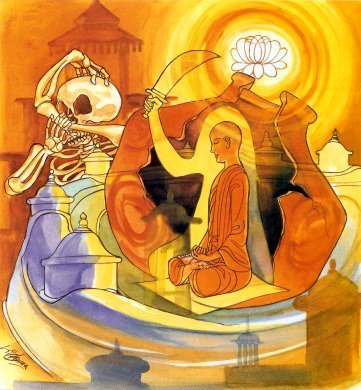Having known this urn-like body,
made firm this mind as fortress town,
with wisdom-weapon one fights Mara
while guarding booty, unattached.
Explanation: It is realistic to think of the body as vulnerable, fragile, frail and easily disintegrated. In fact, one must consider it as a clay vessel. The mind should be thought of as a city. One has to be perpetually mindful to protect the city. Forces of evil have to be fought with the weapons of wisdom. After the battle, once you have achieve victory, live without being attached to the mortal self.
The Story of Five Hundred Monks (Verse 40)
While residing at the Jetavana Monastery, the Buddha spoke this verse, with reference to five hundred monks.
Five hundred monks from Savatthi, after obtaining a meditation topic from the Buddha, travelled for a distance of one hundred leagues away from Savatthi and came to a large forest grove, a suitable place for meditation practice. The guardian spirits of the trees dwelling in that forest thought that if those monks were staying in the forest, it would not be proper for them to live with their families.
They descended from the trees, thinking that the monks would stop there only for one night. But the monks were still there at the end of a fortnight; then it occurred to them that the monks might be staying there till the end of the vassa. In that case, they and their families would have to be living on the ground for a long time. So, they decided to frighten away the monks, by making ghostly sounds and frightful apparitions. They showed up with bodies without heads, and with heads without bodies. The monks were very upset and left the place and returned to the Buddha, to whom they related everything.
On hearing their account, the Buddha told them that this had happened because previously they went without any protection and that they should go back there armed with suitable protection. So saying, the Buddha taught them the protective discourse Metta Sutta at length (Loving-Kindness) beginning with the following stanza:
Karaniyamattha kusalena –
yam tarn santam padam abhisamecca
sakko uju ca suju ca –
suvaco c’assa mudu anatimani.
“He who is skilled in (acquiring)
what is good and beneficial,
(mundane as well as supramundane),
aspiring to attain perfect peace (Nibbana)
should act (thus):
He should be efficient, upright, perfectly upright,
compliant, gentle and free from conceit”
The monks were instructed to recite the sutta from the time they came to the outskirts of the forest grove and to enter the monastery reciting it. The monks returned to the forest grove and did as they were told.
The guardian spirits of the trees receiving loving-kindness from the monks reciprocated by welcoming them and not harming them. There were no more ghostly sounds and frightening sights. Thus left in peace, the monks meditated on the body and came to realize its fragile and impermanent nature.
From the Jetavana monastery, the Buddha, by his supernormal power, learned about the progress of the monks and sent forth his radiance making them feel his presence. To them he said, “Monks just as you have realized, the body is, indeed, impermanent and fragile like an earthen jar.”

